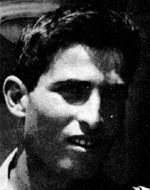Magen (Motzenov), Zvi (“Zvika”)
Son of Moshe and Sarah. He was born on the 13th of Sivan 5706 (February 1, 1946) in Moshav Ein-Iron. He completed his studies at Karkur Elementary School and at the Hadera High School, and even when he was a pupil he had a world view filled with ideals of integrity, responsibility, love of man and homeland. He tended to literature. From the age of 12 until his enlistment in the Israel Defense Forces in July 1964, he was active in youth training, and even as a child, he was able to establish friendships, and his connections with them grew closer and closer to each other. He said: “This is love that is acquired not by the love of the homeland, but rather by the love of the homeland. By sitting at home and looking at landscape pictures but by walking on the paths of the country and feeling un- Placemat landscape and spatial homeland. He was not fit to be a combat soldier when he enlisted, but he did not accept the role of a “Jobnik” in the army and demanded a new examination. He was also repeatedly examined by doctors until he was able to confirm that his back, which he had suffered, was fine. Thus he succeeded in fulfilling his wishes and joining the paratroopers. After completing the course of the platoon commander and officers’ course, he attained the rank of lieutenant, took part in several reprisals, and his commanders finished his praises: From the first meeting, the commander of his unit testified that it was clear that he could be trusted to do his duty and even more – But in deep internal recognition that the work must be done thoroughly and with all his Lev, and when he was discharged from the army in January 1967 he was registered as a student at the Faculty of Medicine at the Tel Aviv University, who said: “The Paratroopers need doctors but not every doctor goes to the paratroopers. It was also recorded in archeology that he hoped to explore the northern Negev, in the days of tension preceding the salt On the day of the general conscription, before the Six-Day War, he did not wait and went out to his unit. “Some people read and others go,” he replied to his mother. When she wonders about it, “I’m going.” In the last postcard to his parents the day before, a reporter wrote: “Just one request to me: Do not be too emotional. The confidence in victory is absolute, and those who know it are aware of the strength and strength of the IDF, and of course there is no doubt about the glorious chapters of history Which the IDF is about to record in the coming days. ” The next day, on the second day of the fighting, he took part in the battle for the liberation of Jerusalem and fell on Ammunition Hill. In the course of the fighting, the commander of a platoon in the Paratroopers Brigade was attacked and, when the force was stopped by the fortified bunker, Peretz himself He was brought to rest at the military cemetery on Mount Herzl in Jerusalem, and a marble plaque was placed in his memory in Ein Iron, commemorating three more fallen soldiers, and his memory was included in a booklet published by the Hadera High School. The paratroopers were given a page on their history and description of their last sacrifice, and the name “The War on Jerusalem” was also mentioned in Moshe Nathan’s book Theo Approaching the heroic Book “published by the Hebrew Journalists Association in Tel Aviv and survivors of Bergen-Belsen.
